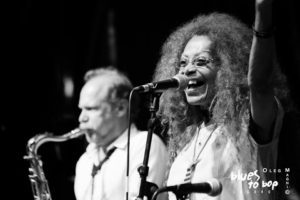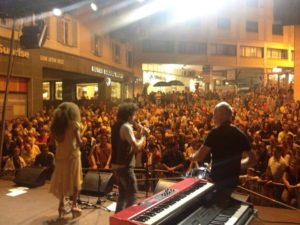
‘Mississippi Millie’ World Renowned Authentic Delta Blues Artist
A child born with a veil over her face, indicating a sixth sense, delivered by her midwife grandmother into a family of six children, Millie remembers not just the hymns she heard the choir sing in the Baptist church where her mother played piano, but also the ‘Devil’s Music’ she heard in the Delta Juke Joints. “They called it the Blues,” says Millie, “and to me it sounded as natural as the willows above and the rich earth below. I would sneak into the local party houses and rundown joints every chance I could, so I could get up on stage and sing with the ‘bad boys.’ They called me the ‘little girl with the big voice.’
When Millie was nine years of age, her mother moved the family from Mississippi to Pennsylvania. While this transition opened up a whole new world for this very inquisitive child, it also strengthened Millie’s devotion to the traditions she had left behind.
Three years later, Millie found herself standing before Philadelphia audiences, belting out tunes made popular by such Blues greats as Dinah Washington and Billie Holliday. She recounts, “Sadly,
whenever I would try to include one of my favorite Delta songs, folks would nix the idea. I really resented this slur on my heritage.”..
During the ’60s, Millie traveled to New York City with her sister. There she was offered the opportunity to tour Europe with the Catherine Dunham troupe as a ‘pivot girl’, the middle dancer with a 10 minute spotlight during which she could display her proficiency in interpretive dance. Millie also took this time to broaden her repertoire to include not only the Blues she loved, but Soul and Rock music, as well. To appease her mother, Millie even took opera lessons! She remembers, “It didn’t matter where I lived, what club or hall I performed in, what kind of music they wanted me to sing…I always took every opportunity to do some Mississippi Blues, the songs I sang were pure Delta.”
Millie’s career gained momentum in the 70s when she was invited to sub for Roberta Hightower, lead singer for the Orlons, a predominantly female group best remembered for their Top Ten hit, “Don’t Hang Up.” Eventually, Millie became the permanent lead, but at the end of five years, she moved to Nashville, TN because she had been offered a songwriting deal! “Unfortunately,” remembers Millie, “Hal Neely and the rest of the folks at Starday King Records did not know what to do with me, since the songs I sang were pure Delta.”
Millie moved across country to Los Angeles where she quickly built a solid fan base gleaned from some of the best Blues artists in the Southern California area (Marie Muldaur, Linda Hopkins, Robert Lucas, White Boy James, Mickie Champion, Evens ‘Neckbone’ Walker, and before their untimely deaths, Albert Collins and Larry ‘Texas Flood’ Davis.) She began making appearances at such venues as the Orange County, Big Time, and San Francisco Blues Festivals.
At various times, Millie’s band included some of the best musicians in contemporary Blues: William Clark, Johnny Dyer, Bernie Pearl, Juke Logan, Deacon Jones, Larry Gales, Robert Lucas, Top Jimmy, Rick Reed, Evans ‘Neckbone’ Walker and Eddie ‘Lips’ Clark. During this rich musical period, Millie also traveled from Los Angeles to the Rhythm Room in Phoenix, Arizona, to headline the Women in Blues Week with KoKo Taylor and Sue Foley. All the while, this deep-down Blues singer remained true to her Delta roots, earning for herself the nickname, ‘Mississippi Millie.’
This was the impetus Millie needed to finally put out a recording of original compositions, about which she had long dreamed, with a couple of songs from one of her Blues idols, ‘Memphis Minnie,’ thrown in for good measure. Titled “Mississippi Millie, Acoustic Delta Blues,” the CD showcased an artist who was able to infuse the original sounds of the Mississippi Delta with her own brand of originality and style, while remaining true to the heart and soul of Delta Blues music. Cuts like “Handful of Trouble,” “Retribution” and “Hush, Child,” born of the struggles that confronted children of the Civil Rights, Anti-War, and Counterculture Movements, reflected the pure earthiness and passionate nature of a most unique performer. “I use my voice to make the Mississippi Delta come alive,”says Millie, “Because I find joy in Blues music and simplicity in all things, it was easy for me to put pen to paper and pour my heart out. I believe that the voice is the first instrument that God ever created. I use my voice to make the Mississippi Delta come alive.”
“I have this theory,” says Millie, “that we are only here on this earth one time, and if we don’t embrace the experience, what is the purpose of living?”.
In recent years, ‘Mississippi Millie’ has toured across the U.S. and in Europe.

Thousands enjoy Millie’s Delta Blues in Switzerland in 2014.
